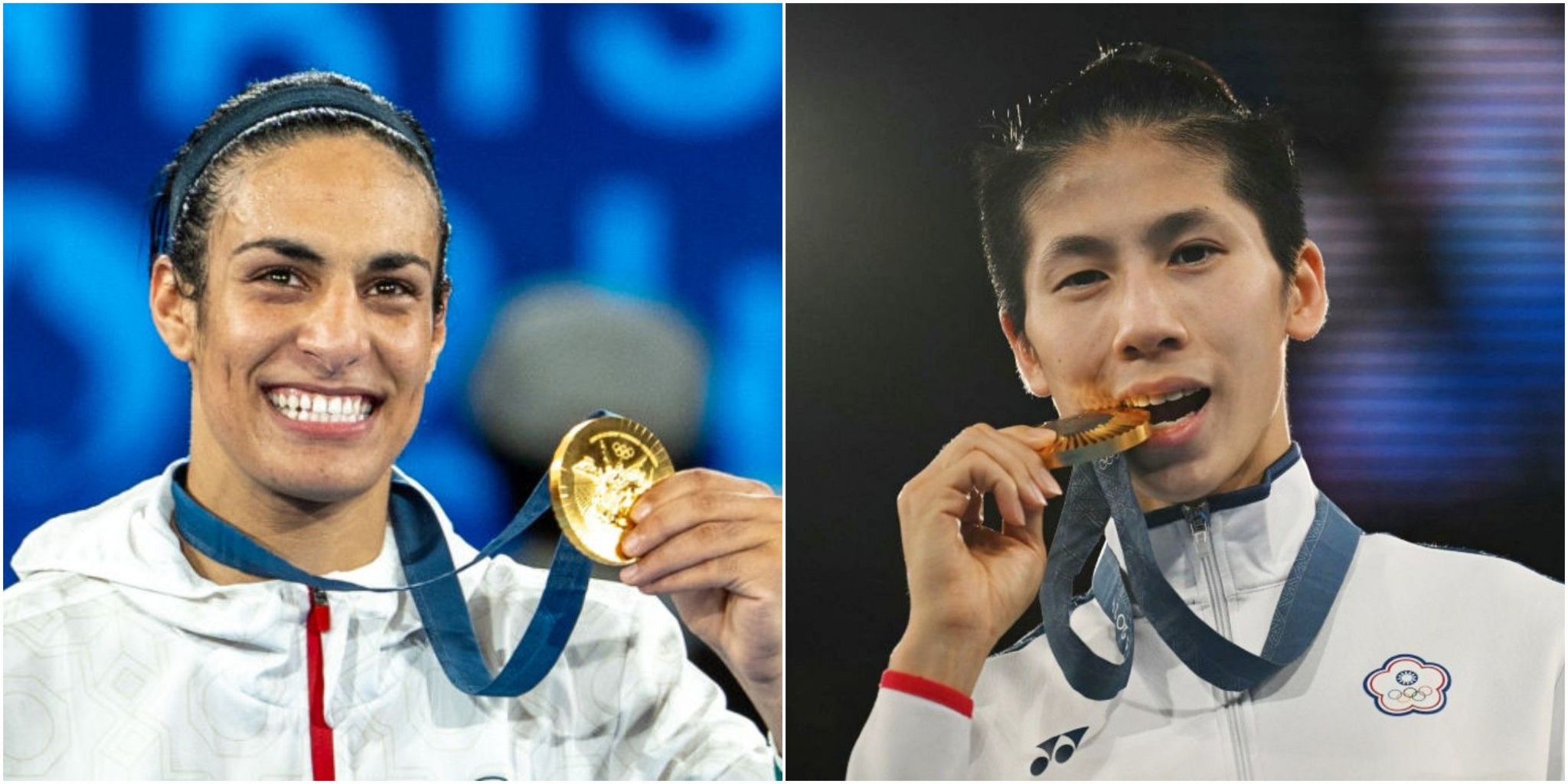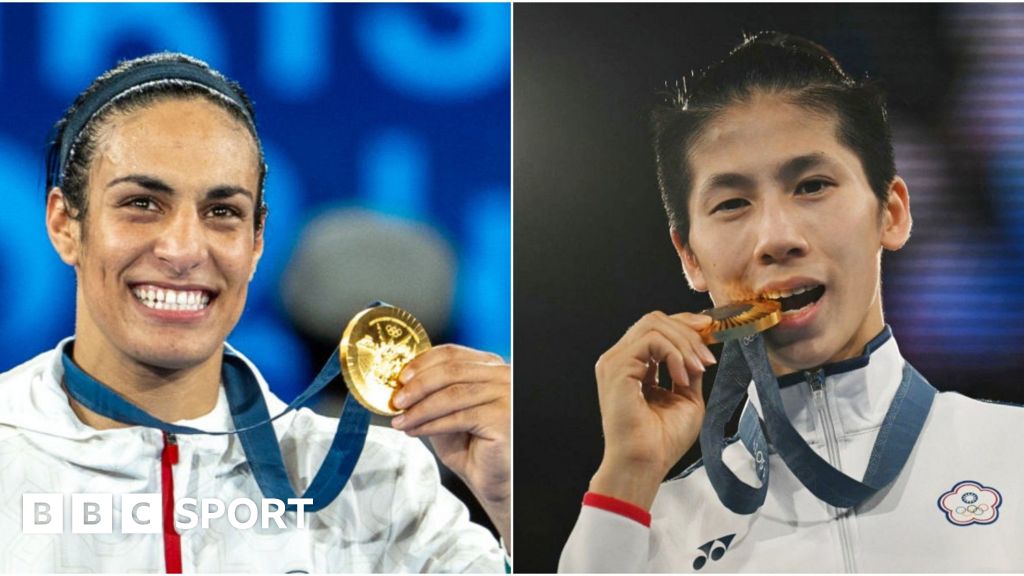The key questions for sport after boxing eligibility row

Khelif (left) and Lin won in the welterweight and featherweight classes respectively
-
Published
Imane Khelif and Lin Yu-ting each won gold in boxing at Paris 2024 amid a global furore of whether they were eligible to compete in the women’s division.
The controversy overshadowed the boxing and, at times, dominated coverage of the Games around the world.
But the end of the Olympics does not mark the closure of this issue as sport is left facing some key questions…
How were the fighters able to win gold in the Olympics but not the World Championships?
The World Championships were run by the Russian-led International Boxing Association (IBA), which disqualified the two fighters for reportedly failing what it called “eligibility criteria” following “gender testing” as a result of “many complaints from several coaches”.
The IBA says blood testing on the two fighters was conducted in May 2022 and March 2023, and that the results “conclusively indicated” that the pair “didn’t match the eligibility criteria for IBA women’s events”.
Since then they have claimed that male XY chromosomes were found in both cases. IBA President Umar Kremlin also said that the tests “show they were men”.
Lin did not appeal the decision, while Khelif did take her case to the Court of Arbitration for Sport (Cas), but then withdrew the appeal.
However, the International Olympic Committee (IOC) suspended the IBA in 2019 amid integrity and governance issues, and then stripped it of its official status last year over a failure to make reforms. The IBA also contravened IOC guidance by allowing Russian competitors at its world championships.
This dispute meant the IOC was responsible for running the boxing competition at the Paris Olympics, as it was in Tokyo. It applies less stringent eligibility criteria.
Despite being informed of the IBA’s test results last year, the IOC has always recognised the boxers as female athletes, insisting that because they were born and raised as women, and are registered as women in their passports, they are eligible for women’s competition under their rules.
Others argue that how someone is registered is not proof of their sex.
However, the IOC has also questioned the legitimacy and timing of the IBA’s tests, making the point that the boxers fought for years without being tested. It also questioned the IBA’s credibility, pointing to a chaotic press conference held in Paris, which featured several inconsistencies, as evidence that their test results cannot be relied upon.
-
-
Published15 hours ago
-
-
-
Published1 day ago
-
Will Olympic boxing change its eligibility rules?
In 2021, the IOC issued new guidance, asking individual sports federations to develop eligibility policies of their own, rather than insisting on a blanket policy based on testosterone levels.
However, with the IOC currently in charge of Olympic boxing due to the dispute with the IBA, and as the controversy around Khelif and Lin has erupted, it has faced mounting pressure to come up with stricter rules of its own to protect the women’s category, and ensure fairness and safety.
This is especially the case after a number of sports federations have toughened up their own sex eligibility regulations in recent years, banning transgender women from elite female competition, and insisting that athletes with differences in sex development (DSD) medically lower their testosterone levels. There is no suggestion that Khelif and Lin are transgender.
The IOC’s eligibility rules for boxing therefore have not kept pace with other sports. The IOC abandoned genetic gender testing in 1999 and seems opposed to changing the rules, partly for fear of stigmatising people, saying that “every person has the right to practise sport without discrimination”.
IOC President Thomas Bach said: “It is not as easy as some may now want to portray it – that XX or XY is the clear distinction between men and women. This is scientifically not true anymore.”
However, Bach also said: “If somebody is presenting us a scientifically solid system – how to identify man and woman – we’re the first ones to do it. We do not like this uncertainty. So, we would be more than pleased to look into it.”
An IOC spokesman has also said that this “is not a black and white issue”
They added: “There are many women with higher testosterone levels than men so the idea that a test is some kind of magic bullet is not true. This is a minefield. If we can find a consensus we will certainly work to apply that. This is a question in all sports, we are open to listen to anyone with a solution to that question. The IOC is always trying to balance inclusivity and fairness, to put it more broadly, also safety. That is a difficult one and something we will have to look at.”
The IOC’s critics argue that achieving such a balance is impossible, and that fairness and safety must be prioritised.
The boxing controversy has fuelled demands for mandatory sex testing at future Olympics, with campaigners calling for the return of a cheek swab test (which the IOC moved away from in 2000). They say that the vast majority of female athletes are in favour of this. However, others have argued that more comprehensive testing is required to be sure about an individual-s genetic makeup, which would raise concerns over cost and invasiveness.
This video can not be played
To play this video you need to enable JavaScript in your browser.
Lin Yu-ting beats Poland’s Julia Szeremeta to win women’s featherweight gold
Will Khelif and Yu-ting be eligible to compete in their next non-Olympic competition?
Until an alternative is established, the IBA will remain as the de facto world governing body of the amateur sport. In which case Lin and Khelif will not be able to fight in its events. But with several countries boycotting IBA events, the sport is under pressure to establish a new governing body. In fact the IOC recently said “we desperately need a federation to run boxing”, and has urged national boxing bodies to create one, or risk the sport missing out on the Olympics in four years’ time.
A new organisation called World Boxing was launched in 2023 and currently has 37 members, still far fewer than the IBA, but is not recognised by the IOC.
As it stands, the IOC will continue to organise Olympic qualifying events which Khelif and Yu-ting can be a part off.
Across sport as a whole, is there a wider issue with DSD athletes in women’s sport?
We do not know if Khelif and Lin are athletes with DSD because the full results of the tests are confidential, and the fighters are yet to declare them. They and their supporters insist they are female.
However, because of what the IBA has claimed (and an IOC mistake when it initially said that this was not a DSD case, before having to retract the statement), this has inevitably led to speculation that they could be DSD athletes, and has renewed debate over how sports should approach the issue.
It has been especially relevant to athletics, in which South African middle distance runner Caster Semenya – who was born with DSD condition 46 XY 5-ARD – twice won Olympic 800m gold. At Rio 2016, all three medallists in the women’s 800m were DSD athletes, including the winner Semenya.
Several top sprinters have also been affected by the sport’s restrictions on DSD athletes, which now cover all track and field events in the female category. Namibia’s Christine Mboma, who 200m silver in Tokyo, and compatriot Beatrice Masilingi have both been affected by the rule change. They along with 11 others had to miss the World Championships in Budapest last year under the new rules requiring DSD athletes competing in previously unrestricted events to suppress their testosterone levels for at least six months before returning to competition.
World Athletics has claimed that while “approximately 1 in 20,000 of the general population have a 46 XY DSD, in elite women’s competition, the proportion is approximately 7 in 1,000 – a prevalence that is 140 times higher”. It argued that “this is strong evidence of a performance advantage”.
However, even within the scientific community there is debate over what physiological advantage DSD athletes actually have, depending on the type of DSD. Some say it is impossible to establish that everyone with a Y chromosome is a male and everyone without a Y chromosome is a female, and that more data is needed.
What action have individual sports taken in regards to competitors with DSD?
World Athletics is one of a number of sports federations that have toughened up rules relating to the eligibility of transgender and DSD athletes in the women’s category.
In 2018 it said DSD athletes could not participate in any women’s event between 400m and one mile – unless they lower their high testosterone levels, which it claimed gives them an unfair advantage because it can boost endurance and muscle mass. It said the rules were needed “to ensure fair and meaningful competition within the female classification”. Athletes could reduce their levels by taking specific drugs.
Since then World Athletics has tightened its rules further, with DSD athletes having to have hormone-suppressing treatment for six months before being able to compete in all women’s events.
Semenya insists there was “never any unfair advantage” and that “sports have never been fair because of genetics”, adding that it was discriminatory and against her human rights. She refuses to undergo treatments and has been engaged in legal disputes over the case for years.
World Aquatics, which has brought in similar regulations to athletics, says that all athletes “must now certify their chromosomal sex with their national federation,” adding that “failure to do so, or provision of a false certification, will render the athlete ineligible”. It also reserves the right to include a chromosomal sex screen in its anti-doping tests.
This video can not be played
To play this video you need to enable JavaScript in your browser.
Algeria’s Khelif wins boxing gold in the women’s 66kg
What has been the impact of this row on the Olympics?
While far from the only controversy at Paris 2024, this was arguably the biggest and most divisive, with the issue dominating media conferences with IOC officials, and receiving huge amounts of coverage, especially with both fighters winning so convincingly and ultimately both claiming gold medals.
At its highest profile event, the IOC found itself accused of neglect, failing women and a denial of science. The turmoil has also tarnished Bach’s final year in charge of the IOC before he steps down in 2025.
It also led to global, and at times uninformed, scrutiny of the two fighters involved, especially on social media, where criticism by politicians and celebrities added to a frenzied and toxic debate over women’s safety, fairness and whether the Games had been tainted.
Indeed, Khelif has filed a legal case against what her lawyer has described as “misogynistic, racist and sexist” cyber bullying, claiming she has been the victim of a “digital lynching”.
In his speech at the opening ceremony, Bach had referenced the “Olympic spirit of living life in peace, as the one and only humankind, united in all our diversity”. Days later he was having to condemn the “hate speech, aggression and abuse” the boxing row had generated, suggesting it was part of a “politically motivated culture war”.
Bach added: “What we have seen from the Russian side and in particular from the IBA is that long before these Games, they have launched a smear campaign against France, against the Games, against the IOC.”
The war of words between the IBA and IOC was certainly an unedifying sideshow, and the boxing competition was gravely overshadowed by the storm, with several opponents of the two fighters making critical comments or staging protests. But it was also a reminder of the highly-charged and challenging geo-political context in which these Games took place.
This is not the first furore sparked by sport’s long struggle to regulate the female category of competition. But it may have been the most ferocious to date.








